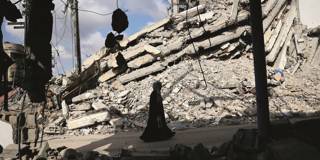A collective response to climate change is crucial to maintaining global stability. But heightened geopolitical tensions and ongoing wars (in Ukraine, Gaza, and many other parts of the world) are complicating international efforts to close climate financing gaps and address other shared problems.
UPPSALA – The worsening climate crisis continues to wreak havoc worldwide, with extreme weather events jeopardizing global peace and stability. A recent NATO report projected that climate change will significantly affect the alliance’s military assets and operations in the Arctic, Europe, the Middle East, and Asia. Meanwhile, other studies have warned that deteriorating living conditions and climate-related shifts in mobility and migration patterns could trigger new conflicts or escalate existing ones.

UPPSALA – The worsening climate crisis continues to wreak havoc worldwide, with extreme weather events jeopardizing global peace and stability. A recent NATO report projected that climate change will significantly affect the alliance’s military assets and operations in the Arctic, Europe, the Middle East, and Asia. Meanwhile, other studies have warned that deteriorating living conditions and climate-related shifts in mobility and migration patterns could trigger new conflicts or escalate existing ones.